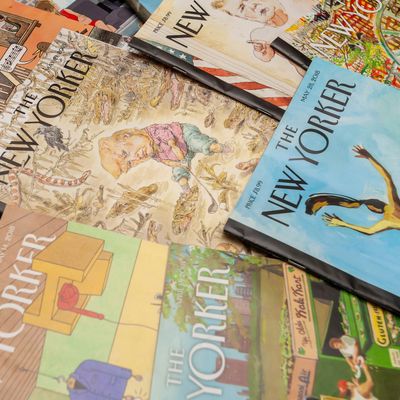
Erin Overbey has worked at The New Yorker since 1994. As archive editor, she publishes a twice-weekly newsletter, excavates work from the magazine’s history, and serves as an internal resource about it. Today, she published the results of just some of her research into 30 years of The New Yorker. Her data so far (which we have not, and could not, independently confirm) shows that:
- In 30 years, 2.5 percent of movie reviews were written by women.
- In 15 years, less than 0.01 percent of print feature and critics pieces were edited by a Black editor.
- In 30 years, 3.6 percent of book reviews were written by Black writers.
She did it, she said, to move forward an important conversation about the role of women and people of color at elite media institutions. Her work was received warmly by many online, though more coolly from colleague Michael Luo, who runs The New Yorker’s website. “It’s worth looking at who we’ve brought aboard as editors, staff writers, and contributing writers over the last several years. It’s an incredibly talented, diverse list,” he wrote online.
“We’ve worked hard for years to increase the number of underrepresented voices at The New Yorker, and we’ve made significant progress — among our writers, in senior editorial positions, and across the entire enterprise,” a spokesperson for The New Yorker wrote in an email. “Nearly 40 percent of new hires at Condé Nast are from diverse and underrepresented backgrounds. While we don’t believe these tweets present a full or fair view of The New Yorker and its ongoing efforts, there is always more work to do, and we look forward to doing it.” (Editor-in-Chief David Remnick declined to comment.)
Your most recent work was published not in the magazine but on Twitter. How did this come to pass? When did you start this work on diversity?
I’ve been having these conversations verbally in-house for years. I would even say decades. I started collecting the data, doing data dives, in 2019. I think this is endemic in what I refer to as gateway media institutions. By that, I mean there are certain media publications that really are gateways, once you get into them, to a promising career in American literary journalism. I would include Harper’s, The Paris Review, and several other publications in that. I might even include New York in that. I started thinking about what is a better way to approach this issue.
I welcome your precision.
When you have conversations about race or diversity with a fellow liberal at a media organization, it almost inevitably turns out with them saying, “Are you saying I’m a bad person? Are you saying I’m racist?” You never really get anywhere. You never get to the heart of what you want to talk about. Does that make sense?
Yes.
There’s always a wall up. But what about data? Numbers don’t really lie, and numbers don’t have an emotional attachment to them. I started in 2019 looking at our tables of contents. It really was a lengthy project. So I was looking into these things if I had an off evening; on a Monday night; if I wasn’t going out for drinks; or on the weekend sometimes. Once you get going, it’s kind of hard to stop. I guess I could have done it really flippantly, but I don’t do that. I wanted to make sure I was doing multiple passes.
So you have a vast data warehouse that you’ve triple-checked, over what is now years, as a hobby.
Probably if we were to count up the actual time, it would be a period of several months, maybe like six months. And I have more data that I didn’t include in there that I don’t know if I’m going to — we’ll just see.
Did you get any institutional support or opposition on this? Did David Remnick hover menacingly?
No, I have not, no. I haven’t received any institutional feedback as of yet. The day is still — well, it’s 4 p.m. We’ll just see! I want to make very clear: David Remnick is a very decent guy.
I’m sure.
And I’m not saying you’re not saying that! And I deliberately chose a 30-year span, which covers three editors. It covers David, it covers Tina [Brown], and it covers [Robert] Gottlieb. No, nothing menacing as of yet. My hope would be that it would not be the case. This is data. It’s honest data. If we’re not even open to the data, how are we actually going to move the needle forward?
Why Twitter?
I’m not someone with like 100,000 followers. I’m not like Joy Reid; I’m not someone who’s followed by a million people. I honestly thought it would be like New Yorker–philes and people who are very interested in magazine trivia who follow me.
It did a nice job of inserting the conversation into the culture.
I think Twitter is a good medium for starting a conversation. Medium is where I see all the revenge posts — people with grievances. I felt in a way that Twitter was more of an equivalent of an in-house discussion like I have been having over the years.
Are you comfortable with the level of attention you’re getting?
Uh, no. Can I say that louder? No! Yeah, no. But I don’t understand when people say, “Oh, but it’s going to make things awkward or make things uncomfortable.” Imagine how the staffers of color feel. The best way to avoid attention is to never make trouble, never bring anything up, just be docile.
What’s notable to me in talking to you is that you did this with real New Yorker rigor.
I went through the figures over and over and over again. I think when you work right next door to the fact-checkers, and I’ve been there so long, you have to absorb some of that. Also, I didn’t want this to be “she said, the institution said.” I didn’t want this to be about emotions; I didn’t want this to be about personalities. I wanted this to be about clear data that’s kind of irrefutable.
Did you have an editor work on this for you?
No. Should I have had an editor? Do people have Twitter editors? No, it never even occurred to me to have someone look at it. I have a 32-page document. I have everything in there.
I’m going to ask you a very troll-y question: Were you ever a big Joyce Carol Oates fan?
I feel like my natural response to these tweets was the best one. It sounds strange to say this, but my first reaction was laughter — not mocking her, just a gentle laughter. Then the second reaction was, you know, I like anyone who wants to participate in the conversation. I’m a strange American, I guess; I don’t really take personally anyone who disagrees with me. But honestly, she’s of a generation that’s very much an institutionalist protective thing. There’s also very much, in Manhattan media and prestige media, an institutionalist mind — like, protect the institution at all costs.
What are you going to do tonight? Are you going to step away from the internet and unwind?
I don’t think the internet will let me do that. I will probably be working tonight. I have other work to do! I might even be looking at some of the extra data.
This interview has been condensed and edited.






























